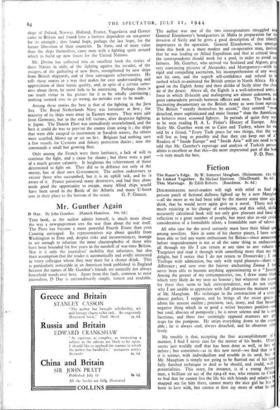Mr. Gunther Again
Tins book, as the author admits himself, is much more about the way a newspaperman sees the war than about the war itself. The Press has become a more powerful Fourth Estate than even Canning envisaged. Its representatives nip about quickly from Washington to Etna and, despite risks and inconveniences, manage to see enough to infuriate the more claustrophobic of those who have been bounded for five years in the nutshell of war-time Britain. Nor is it only the journalists' mobility that infuriates, but also their assumption that the reader is automatically and avidly interested in every colleague whom they may meet for a chance drink. This is particularly noticeable in an American book published in England because the names of Mr. Gunther's friends are naturally not always household words over here. Apart from this fault, common to most journalists, D Day is extraordinarily simple, honest and readable.
The author was one of the two correspondents smuggled lab General Eisenhower's headquarters in Malta in preparation for di; invasion of Sicily and he gives a good description of that island'; importance in the operation. General Eisenhower, who emerge from this book as a most modest and co-operative man insist that he was leading an Allied Expedition and that at critical tint the correspondents should work for a pool, in order to avoid fairness. Mr. Gunther, who arrived via Scotland and Algiers, giv very convincing pictures of Alexander, and Montgomery—with h rigid and compelling asceticism, his incomprehension of any wor not his own, and the superb self-confidence and refusal to rushed which re-animated the British armies in North Africa. He good on the Eighth Army and their dislike of Sicily after the de air of the desert. Above all, the Eighth is a well-informed army, force in which ill-health and malingering are almost unknown, great camaraderie prevails between officers and men. The book is fascinating documentary on the British Army as seen from outsid The British " stratify themselves by accent," they seemed "mo detached, more sophisticated and more literate" than the America as behoves more seasoned fighters. In periods of quiet they we to be seen reading H. A. L. Fisher's History of Europe. Af Sicily Mr. Gunther went on to Cairo and Turkey, where he w told by a friend, "Every Turk prays for two things, that the w will last as long as possible and that they can keep out of it Readers of " Inside Europe " and " Inside Asia " will not need to told that Mr. Gunther's reportage and analysis of Turkish pers alities is excellent or that this—the more impersonal part of the bo






















 Previous page
Previous page